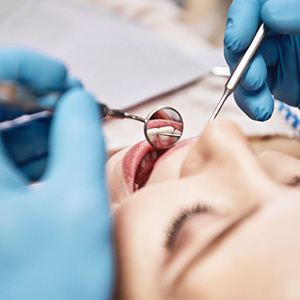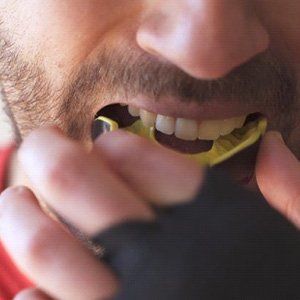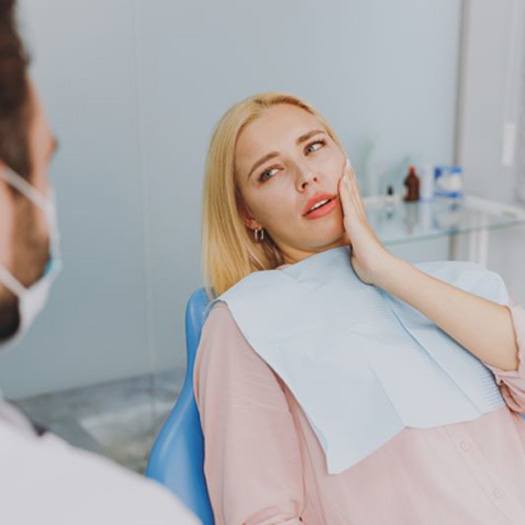Emergency Dentist – San Antonio, TX
Same-Day Treatment
for Dental Crises

It may be natural to assume that any kind of emergency warrants a trip to the local ER, but the truth is that when it is a dental injury, your emergency dentist in San Antonio is likely to be of greater help. At Orbis Dental Group, our dentists are available to provide same-day emergency appointments for individuals suffering from dental crises. Whether it is a broken or knocked-out tooth or a severe gum laceration, we can deliver the immediate care you need to ensure a healthier, damage-free smile for the future. Call us if you ever need care right away!
Why Choose Orbis Dental Group for Emergency Dentistry?
- Same-Day Treatment for Emergency Patients
- Three Methods of Sedation Dentistry Available
- Effective Restorative Solutions with Natural-Looking Materials
How We Treat Dental Emergencies

The first step is to call our office so that a member of our team can evaluate the severity of your situation and determine how quickly you need to get in to see one of our qualified dentists. Once you arrive for your appointment, we’ll escort you to a treatment room where digital X-rays and imaging will commence, as this will allow us to analyze the problem area more thoroughly. After compiling our findings and reviewing the issue, we will craft a personalized treatment plan and go over the details with you. Once you approve, we will begin to administer appropriate treatment to help you out of any pain while also improving the state of your smile.
The Most Common Dental Emergencies
Not all dental emergencies are created equal. Some are more serious than others, requiring immediate attention. To help you determine just how significant your injury might be, we encourage you to review the details provided below. This can serve as a guide to help you manage any pain at home while also discovering how we plan to treat the issue once you arrive at our dental office.
Understanding the Cost of Emergency Dentistry

The cost of emergency dentistry varies from case to case. It depends primarily on the nature of your dental problem and your personalized treatment plan. After our initial exam, we can discuss some specific pricing information and help you to understand your payment options. We will do all we can to make the financial aspect of your care as easy as possible.
Every Dental Emergency Is Different

In most cases, a basic emergency exam, along with any necessary X-rays, is fairly affordable. After the exam, we will recommend a treatment plan. A range of services can be used to address emergency oral health situations, and each one can vary in cost. For example, you might need:
- Root canal therapy
- Tooth extractions
- Crowns or fillings
- Treatment for TMJ disorder
- Other services
Once we get a chance to learn the details of your situation, we can recommend your next steps and help you consider the pros, cons, and cost of each treatment option.
Taking Care of Your Smile Can Save You Money

Thinking ahead can help you to avoid or reduce unexpected dental care expenses. For example, you should take steps on a daily basis to minimize the risk of harm to your smile. Thorough oral hygiene and a balanced diet are both important.
It is also important to bear in mind that you should request an appointment with us as soon as you suspect that something is wrong with your oral health. Most dental problems develop slowly and worsen over time, so the earlier you receive a diagnosis, the more likely it is that the issue can be taken care of with conservative, minimally invasive treatments. In contrast, unnecessarily delaying treatment can allow the situation to worsen to the point where you require extensive and high-cost procedures.
Does Dental Insurance Cover Dental Emergencies?

Most dental insurance plans cover one emergency exam per year. It is also standard for them to cover at least a portion of the cost of restorative services, such as fillings, crowns, and more. Of course, coverage varies greatly between dental plans, so you will need to check the details of your policy to find out how it might apply to any given situation. Our team will be happy to help you file claims.
Other Options for Making Dental Emergencies Affordable

Beyond insurance, there are a few other provisions that might make it easier for you to afford emergency dental care:
- In-house membership plan. Our membership plan covers all preventive care as well as emergency exams and all necessary X-rays. It also provides a 20% discount on all other services.
- We are happy to accept third-party financing from CareCredit, Sunbit, and Allegra. Applying is easy, and most patients are eligible for a low-interest payment plan.
- If you are new to our practice, you can get your first exam, including X-rays, for just $90.
Do you have questions about emergency dentistry and its cost? Get in touch with the Orbis Dental Group team today. We are eager to speak with you!
How to Prevent Dental Emergencies

The team at Orbis Dental Group is always ready to help you if you encounter a dental emergency. However, we are sure that you would prefer to avoid such situations if possible! While it is impossible to completely eliminate the risk of dental emergencies, you can take steps to reduce the chances that you will suffer one. Here are some practical tips that you should apply:
Visit Your Dentist Regularly

Try to make it a habit to visit us for a checkup and routine maintenance at least once every six months. These appointments can help to prevent emergencies in a couple of ways:
- We can identify and treat most oral health problems while they are still in their early stages, long before they start to cause obvious symptoms.
- Thorough dental maintenance visits get rid of plaque and tartar on your teeth, thereby reducing your risk of decay.
Maintain Good Oral Hygiene Habits at Home

Diligent oral hygiene at home can do much to reduce your risk of tooth decay and gum disease. You should:
- Thoroughly brush your teeth at least twice a day. Use a soft brush, and be sure to clean the area along your gumline as well as the back side of your teeth.
- Floss at least once a day. Floss cleans debris and bacteria out of places that your toothbrush cannot reach.
- Drink lots of water. Staying hydrated promotes saliva production and helps to rinse away food particles and bacteria.
Be Careful with Your Diet

Careless food choices can easily lead to a dental emergency. Try to minimize your intake of sugary and acidic items, such as sports drinks, sodas, and candies. You should also be cautious when eating any food with hard parts, such as bone-in meats and popcorn. Try to center your diet on nutrient-dense foods that support oral health. For example, you should consume lots of veggies and lean proteins.
Wear a Mouthguard

If you tend to grind your teeth at night, you might need a mouthguard to place a barrier between your upper and lower arches. This can reduce wear and tear on your teeth.
If you play sports, you might need a different type of mouthguard — one that is specifically designed to reduce your risk of injuries. Over-the-counter sports mouthguards are somewhat effective, but custom options provide better protection and increased comfort.
Do Not Use Your Teeth as Tools

It can be tempting to use your teeth to open packaging, trim your fingernails, cut the tags off of new clothing, or even pry the tops off of stubborn bottles. It is important to keep in mind that your teeth are not designed for those tasks; they could easily break! You might consider carrying a small multi-tool with you so you can avoid using your teeth for any task that might harm them.
Dental Emergency FAQs

The team at Orbis Dental Group is ready to leap into action when you face an urgent dental problem. Before you choose us as your emergency dentist, however, you might want to know more about how to handle various oral health problems and what to expect from the treatment process. Below, you will find answers to some FAQs. If your specific questions are not touched on here, give us a call. Our front desk staff will be happy to speak with you!
Will My Toothache Go Away on Its Own?
Badly damaged teeth cannot heal on their own, so it is unlikely that your toothache will disappear without professional treatment. However, there are some situations in which the pain might go away. For example:
- If your pain is coming from near a tooth, rather than the tooth itself, the toothache might resolve on its own. This can sometimes occur in individuals who have a sinus infection or some minor irritation in their gum tissue.
- If the nerve inside your tooth dies, it will lose its ability to send pain signals to your brain. However, the infection that killed the nerve can continue to spread and cause damage. This is an urgent situation that requires immediate treatment.
How Should I Sleep with Tooth Pain?
For many people, tooth pain seems to get worse at night. Here are some tips that might help you sleep:
- Make sure your head is elevated. This can prevent blood from rushing to your tooth and worsening your pain.
- Take appropriate doses of pain medication. Some people find success with ibuprofen or acetaminophen.
- Use a cold compress. This can dull pain. Just be sure that you do not fall asleep with ice on your face; prolonged exposure to cold can damage your skin.
- Choose your food carefully. If you enjoy a bedtime snack, be sure to choose something that is soft and easy to chew. For example, you might have a glass of milk, a banana, or some applesauce.
My Chipped Tooth Doesn’t Hurt. Do I Still Need to Visit?
Even if your chipped tooth does not hurt, it would be wise to schedule a dental appointment as soon as you can. Without treatment, the damage to your tooth could become worse over time. Plus, its jagged edges might irritate nearby soft tissues. Our team can assess the damage and recommend a treatment to prevent further problems.
What Does Chronic Bad Breath Mean?
Chronic bad breath can be a sign of various problems. For example, it can indicate an infection that requires prompt treatment. In other cases, it points to the need for improvements in oral hygiene, certain medical conditions, or other issues. If you have bad breath that lasts for more than a few days, our team can help you figure out the problem and recommend your next steps.
I Need a Checkup & Cleaning I Want a Holistic Dentist I am Worried About Gum Disease I Want a Straighter Smile I Have a Cavity or Broken Tooth I am Missing One or More Teeth I Want to Enhance My Smile I Have Jaw Pain I'm Having Trouble Sleeping I am Scared of the Dentist View Our Services

